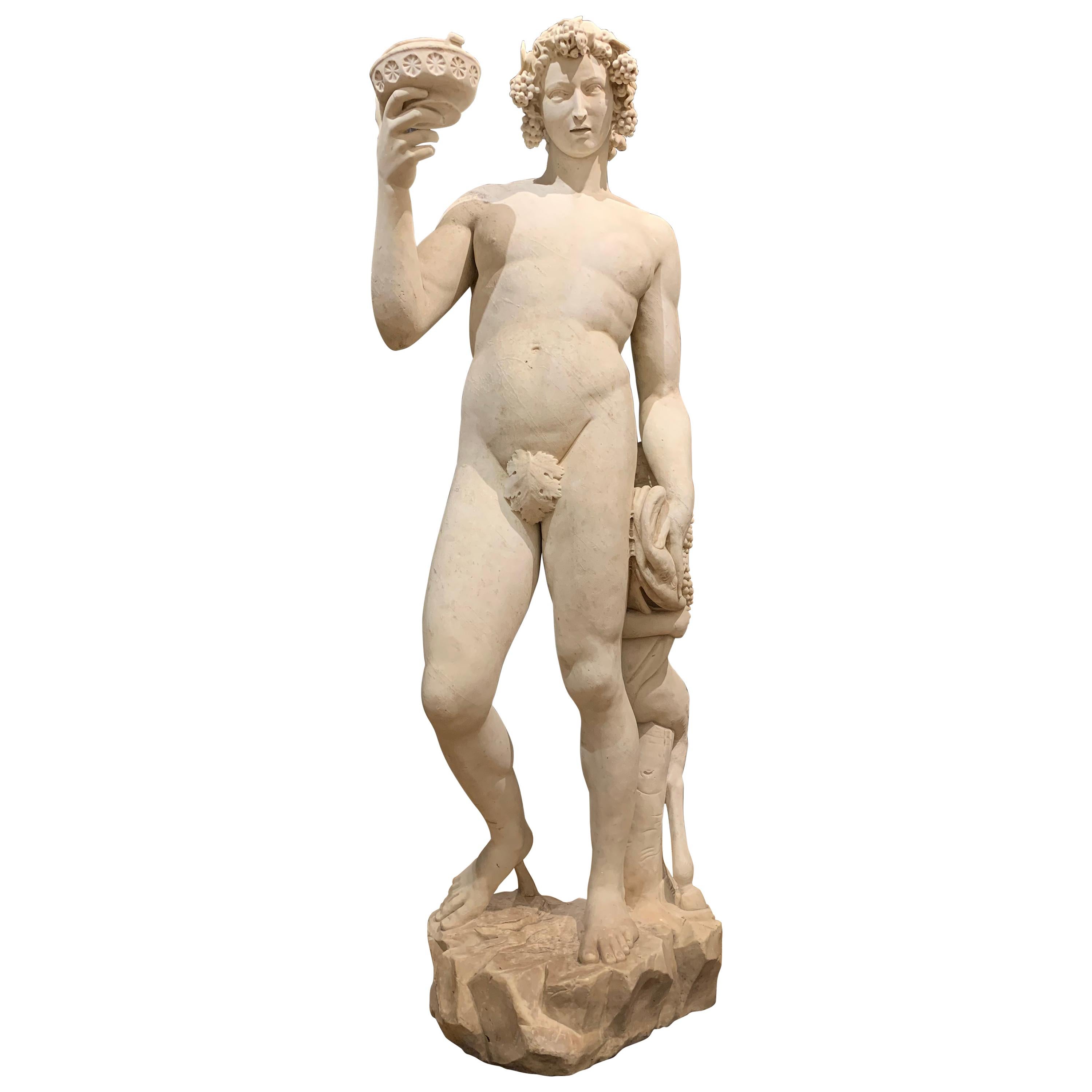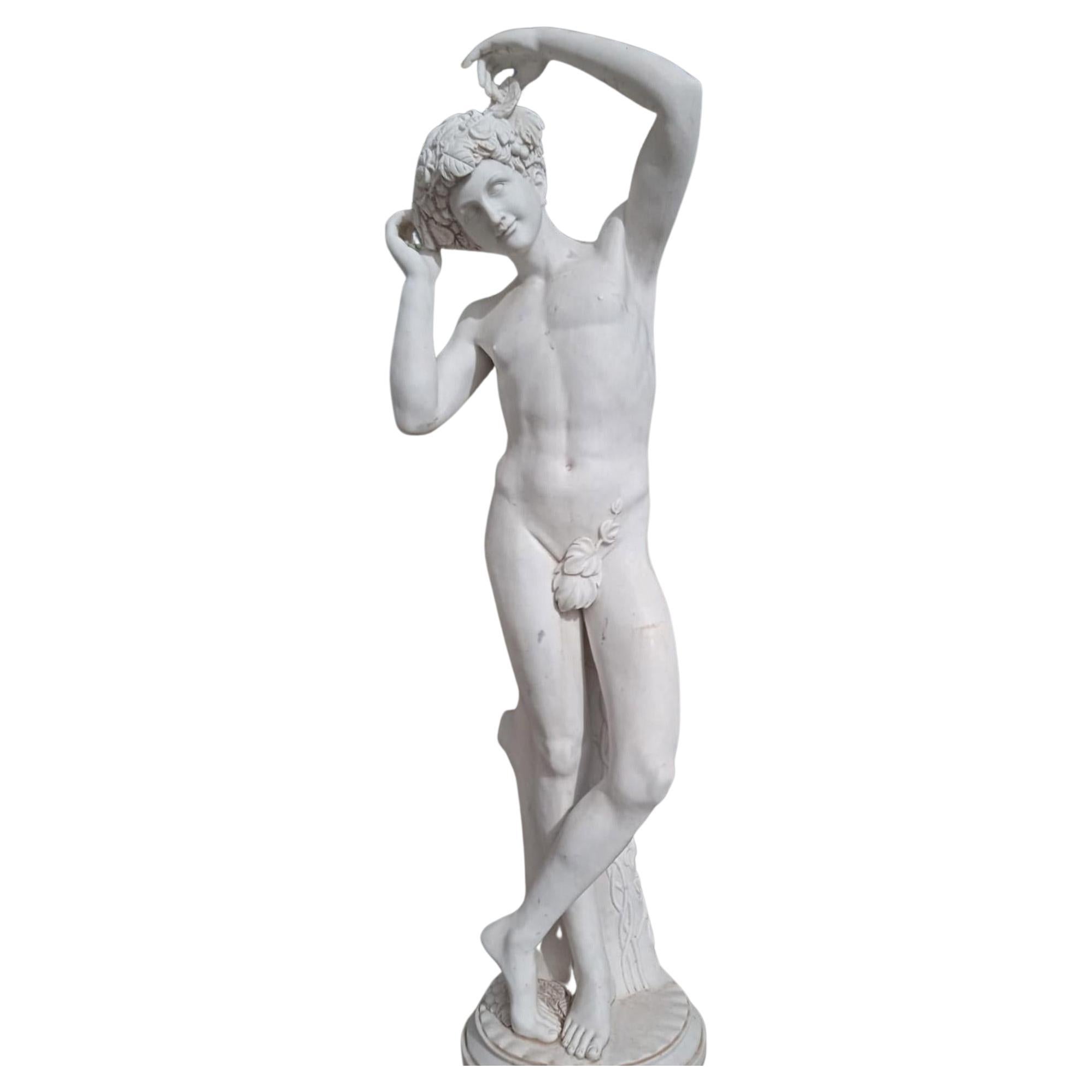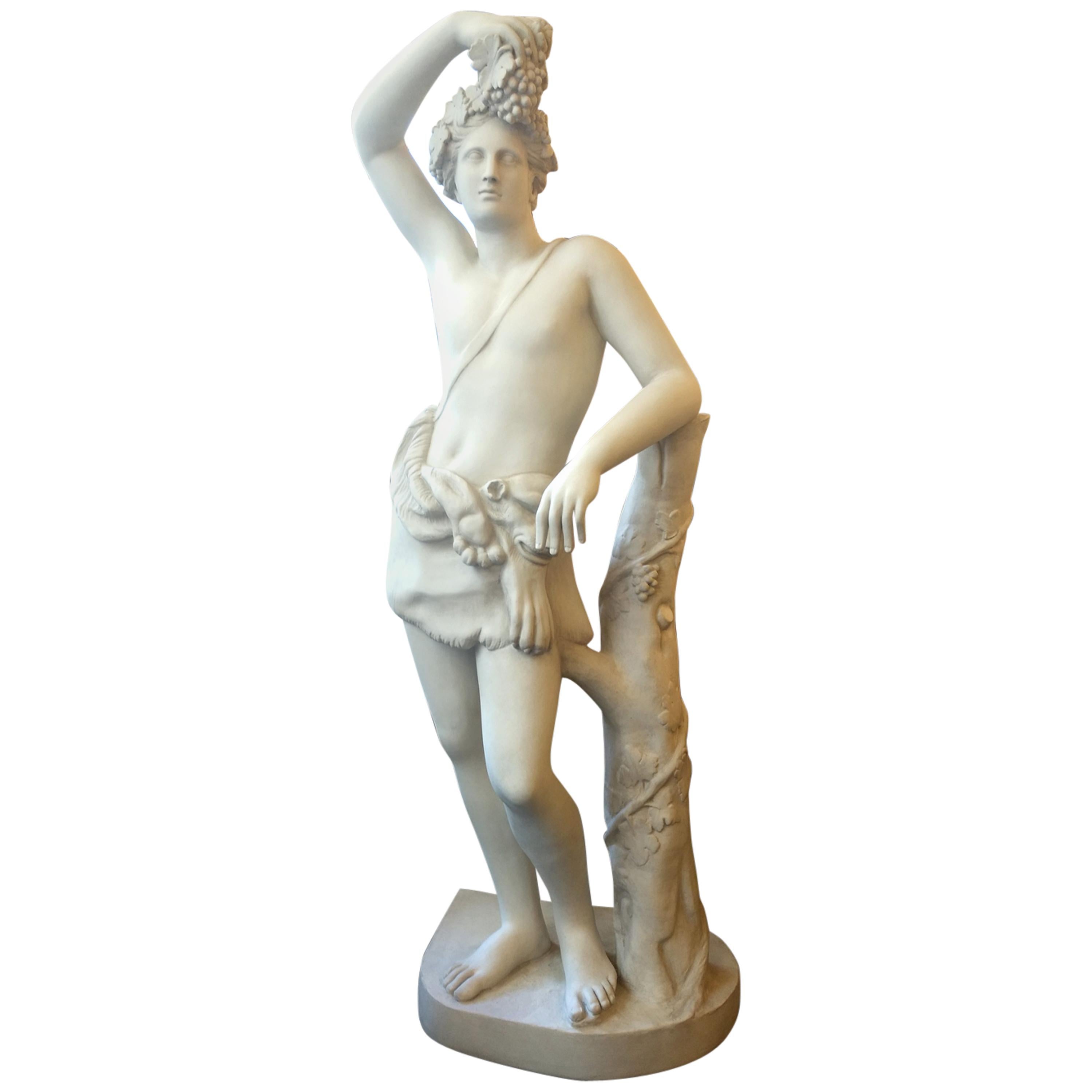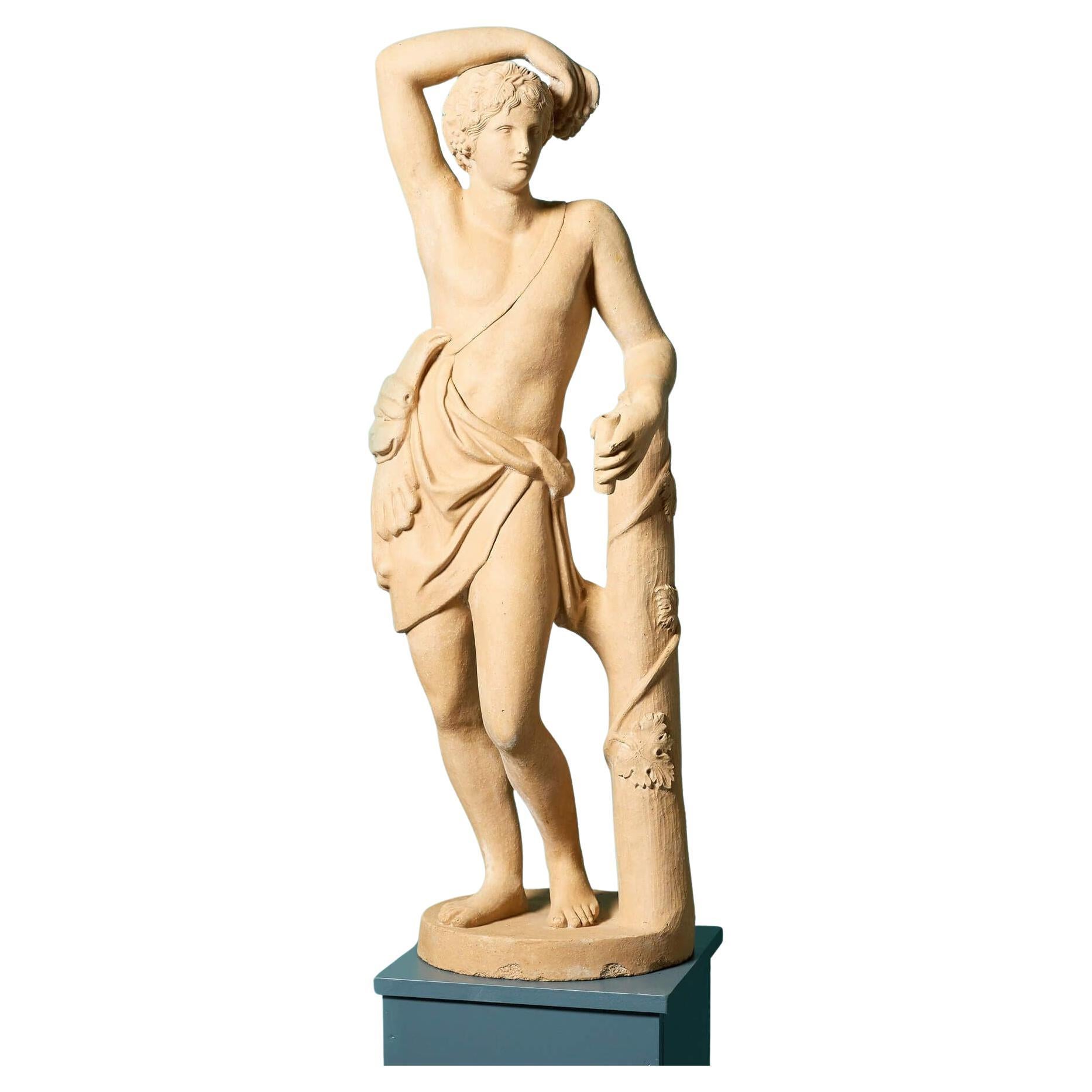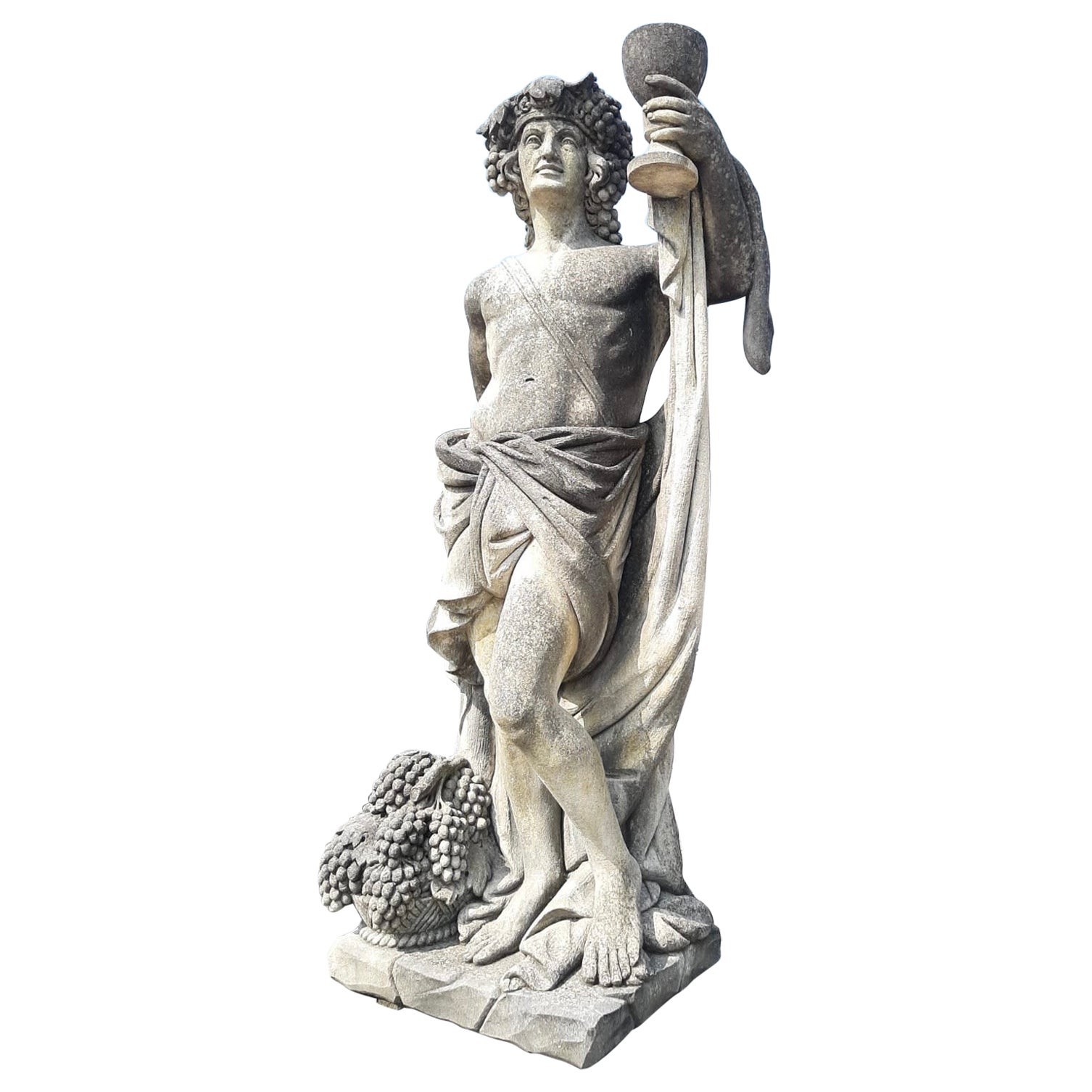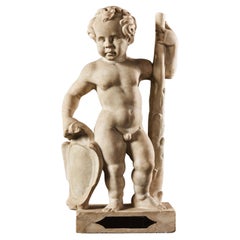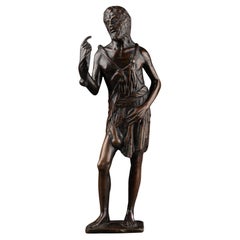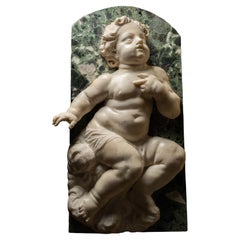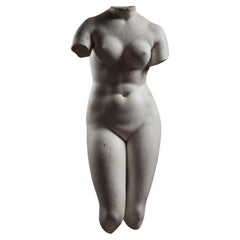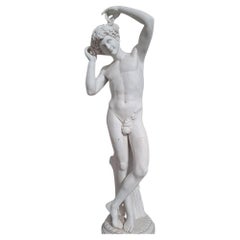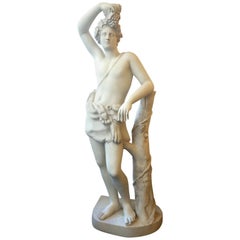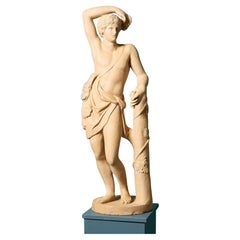Items Similar to Bacchus - Southern Italy, late 17th century
Want more images or videos?
Request additional images or videos from the seller
1 of 6
Bacchus - Southern Italy, late 17th century
$3,111.86
£2,295.47
€2,600
CA$4,311.63
A$4,681.60
CHF 2,479.25
MX$57,382.97
NOK 30,681.67
SEK 28,992.56
DKK 19,793.44
About the Item
Bacchus
Southern Italy, late 17th century
Alabaster Sculpture
H: 20 cm
A finely carved 17th-century alabaster sculpture of a naked Bacchus. This Italian alabaster figure depicts Bacchus, the god of wine and the vine, but also the god of festivities, dance, nature, pleasure, and abundance, holding fruits and grapes.
Alabaster, a soft and translucent stone, was highly prized by 17th-century Sicilian sculptors for its ability to mimic the softness of human skin and for the way it captured light. This made it particularly suitable for the creation of detailed figurative works, such as this statuette of Bacchus, but also saints, and other mythological or religious figures that were common subjects during this era.
The process of carving alabaster required skilled craftsmanship, as the stone was soft enough to be intricately carved but could also break or fracture if handled improperly. Sicilian artists, often trained in both local traditions and the broader European Renaissance influences, excelled in producing finely detailed works that highlighted their technical ability.
This statuette was probably brought back after a long journey across Europe. Known as "The Grand Tour," this journey was undertaken by many artists and aristocrats, who sought to immerse themselves in the study of the arts and classical culture.
- Dimensions:Height: 7.88 in (20 cm)Width: 2.76 in (7 cm)Depth: 1.58 in (4 cm)
- Style:Baroque (Of the Period)
- Materials and Techniques:
- Place of Origin:
- Period:
- Date of Manufacture:17th century
- Condition:Wear consistent with age and use.
- Seller Location:Bruxelles, BE
- Reference Number:1stDibs: LU6666243969492
About the Seller
5.0
Vetted Professional Seller
Every seller passes strict standards for authenticity and reliability
1stDibs seller since 2022
15 sales on 1stDibs
Typical response time: <1 hour
- ShippingRetrieving quote...Shipping from: Bruxelles, Belgium
- Return Policy
Authenticity Guarantee
In the unlikely event there’s an issue with an item’s authenticity, contact us within 1 year for a full refund. DetailsMoney-Back Guarantee
If your item is not as described, is damaged in transit, or does not arrive, contact us within 7 days for a full refund. Details24-Hour Cancellation
You have a 24-hour grace period in which to reconsider your purchase, with no questions asked.Vetted Professional Sellers
Our world-class sellers must adhere to strict standards for service and quality, maintaining the integrity of our listings.Price-Match Guarantee
If you find that a seller listed the same item for a lower price elsewhere, we’ll match it.Trusted Global Delivery
Our best-in-class carrier network provides specialized shipping options worldwide, including custom delivery.More From This Seller
View AllHercules Holding a Coat of Arms, Flemish, XVII Century
Located in Bruxelles, BE
Hercules holding a coat of arms
Flemish, XVII century
White and black marble
Measures: 67 x 32 x 19 cm
Hercules is depicted naked, holding a coat of arms with the right hand an...
Category
Antique 17th Century Belgian Renaissance Figurative Sculptures
Materials
Marble, Belgian Black Marble
$13,401 Sale Price
20% Off
Saint John the Baptist
- After a model by Bertoldo di Giovanni
Located in Bruxelles, BE
Saint John the Baptist
Bronze
After a model by Bertoldo di Giovanni (ca. 1440–1491)
Northern Italy, 18th century
27,5 x 8 x 5 cm
This finely cast and patinated bronze statuette ...
Category
Antique Late 18th Century Italian Renaissance Figurative Sculptures
Materials
Bronze
Carlo Marcellini 'Florence 1644 – 1713', Florentine Baroque Putto
Located in Bruxelles, BE
Carlo Marcellini (Florence 1644 – 1713)
Putto
White and green marble
41.5 x 73.5 cm
This marble putto carved in high relief, almost a tutto tondo, and set on an elegant green marble background, appears almost naked, sitting on a cloud. His peculiar pose, in adoration, suggests that the work was a part of a larger composition including other figures in devotion.
Published in 2007 by Sandro Bellesi in the monograph dedicated to Gioacchino Fortini (pg.155), this beautiful marble putto was included in the catalog of Carlo Marcellini, a prominent figure in the baroque renewal of Florentine art.
Born in Florence in 1644, Carlo Marcellini received his artistic education in the city of the lily, specializing in stone sculpture and stucco modeling under the guidance of Bartolomeo Cennini before continuing his studies in Rome in the Accademia Medicea founded by the Grand Duke Cosimo III in order to familiarize some more promising artists with the essential “ taste of Rome ”.
Under the guidance of Ercole Ferrata and Ciro Ferri, Giovan Battista Foggini...
Category
Antique 17th Century Italian Baroque Figurative Sculptures
Materials
Marble
Venus Pudica (Medici-type) - 18th century, Italy
Located in Bruxelles, BE
Monumental sculpture representing the Venus Pudica (Medici-type)
18th Century
Italian (Rome)
White marble
Based on a model from Antiquity, the Medici Venus, currently in the Uffizi ...
Category
Antique Early 18th Century Italian Grand Tour Figurative Sculptures
Materials
Marble
Cercle of Romano Alberti, Page, Around 1530-1540
Located in Bruxelles, BE
Cercle of Romano Alberti, dit Il Nero da Sansepolcro ( San Sepolcro, 1521-1568 )
Page
Mixed media : wood core, papier mâché, stucco, polychrome and gilded
Italy, around 1530-154...
Category
Antique 16th Century Italian Renaissance Figurative Sculptures
Materials
Stucco, Wood, Paper
$12,444 Sale Price
35% Off
Cercle of Juan Martinez Montañés '1568-1649', Infant St John the Baptist
Located in Bruxelles, BE
Cercle of Juan Martinez Montañés (1568-1649)
Infant St John the Baptist
Spanish, 17th century
H 74 cm
Saint John the Baptist is here represented naked, sitting on a rock, with...
Category
Antique 17th Century Spanish Renaissance Figurative Sculptures
Materials
Wood
You May Also Like
19th Century over Life-Size Marble Statue of Bacchus after Michelangelo
Located in Essex, MA
Mid-19th century over life-size carved marble statue of Michelangelo's "Bacchus". Grand Tour copy through the "Point To Point" method directly from the original keeping its masterful proportions and Fine details in an exact size to Michelangelo's work. We have never seen a 19th century copy of this Renaissance Masterpiece of this size and are quite fortunate to be responsible for its stewardship until purchase by a discerning collector
The original "Bacchus" is a marble sculpture by the master, Michelangelo, created circa 1496 when the artist was 21. This statue was originally commissioned by Cardinal Raffaele Riario. However, it was rejected by him and eventually found its way to Jacopo Galli, Cardinal Riario’s banker and a friend of the sculptor, who purchased it in 1506. Some 66 years later it was bought for the Medici and transferred to the royal house in Florence, Italy. Currently it can be viewed at the Museo Nazionale del Bargello in Florence. It is one of just two sculptures surviving Michelangelo’s initial period in Rome, with the other being Pieta.
The artwork:
This somewhat oversized...
Category
Antique 19th Century Italian Renaissance Statues
Materials
Marble
Bacchus sculpture
Located in Rome, IT
Large marble sculpture of bacchus, 20th century.
Category
Mid-20th Century Figurative Sculptures
Materials
Marble
$11,487 Sale Price
20% Off
Bacchus, Plaster Statue, France, circa 1930
Located in Paris, FR
Beautiful old plaster statue, in the neoclassical spirit, representing young Bacchus.
France, National Museums molding workshop, circa 1930.
Category
Vintage 1930s French Classical Roman Figurative Sculptures
Materials
Plaster
Antique Italian Neoclassical Stoneware Statue of Bacchus
Located in Wormelow, Herefordshire
An antique Italian Neoclassical buff stoneware statue of Resting Satyr, after the antique.
Dating circa 1880, this French sculpture is of a small scale in a desirable neutral tone...
Category
Antique Late 19th Century Italian Grand Tour Figurative Sculptures
Materials
Stoneware
Italian Marble Statue of Bacchus holding a basket of fruit and flowers
Located in Houston, TX
18th century of marble Statue of Bacchus.
The main body is leaning against a tree stump.
Holding a basket of flowers. In his raised hand.
He is ho...
Category
Antique 18th Century Italian Figurative Sculptures
Materials
Marble
$6,650 Sale Price
30% Off
Italian Stone Garden Sculpture of Roman Mythological Subject Bacchus
Located in Rome, IT
Finely carved mythological roman subject of Bacchus or Dionysus in limestone. Excellent condition from an estate of Veneto.
Measurements: Statue cm 180, base cm 85.
Price is not inc...
Category
Late 20th Century Italian Neoclassical Statues
Materials
Limestone
More Ways To Browse
17th Century Italian Furniture
Antique Southern Furniture
Antique Sicilian
Bennington Vermont
Benvenuto Cellini
Borghese Bronze
Bronze Fruit Sculpture
Bronze Violin
Carved Indian Statue
Chinoiserie Man
Dumaige French Bronze Sculpture
Emile Pinedo
End Of The Trail Sculpture
Fabrication Francaise
Felguerez Sculpture
Figurines Hungary
Gaston Bronze
German Antique Bronze Sculptures
